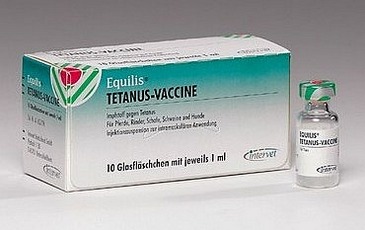The vaccine against tetanus – A vaccine against lockjaw
What is tetanus?
Stolbnyak – bacterial infection, that acts on the nervous system. Tetanus may result in severe muscle spasms, and can lead to disease, known as lockjaw (spasm of masticatory muscles), in which the mouth is closed, and can not let go.
Tetanus can be fatal.
Tetanus occurs, when the bacterium Clostridium Dathan It enters the body through skin wounds. The bacteria can penetrate the soil, dust or animal feces. The bacterium produces a toxin, that causes the disease.
This infection is most common among people aged 50 and older. Besides, people, who have not been vaccinated against tetanus, are not updated regularly vaccinated against tetanus, use intravenous drugs, who have skin sores or wounds, or who had burns and open wounds, are at increased risk of developing tetanus.
What is tetanus vaccine?
The vaccine against tetanus – inactivated toxoid (substance, that can create an antitoxin). There are different types of vaccines, to prevent tetanus:
- DPT – introduces children to protect against diphtheria, tetanus and pertussis;
- Tdap – introduces children, adolescents and adults to protect against tetanus, diphtheria and whooping cough;
- Td – introduced adolescents and adults to protect against tetanus and diphtheria.

Who and when to be vaccinated against tetanus?
DPT
Vakцinaцija DPT, usually, is required before starting school. Routine immunization is carried out in the following terms:
- 2 of the month;
- 4 of the month;
- 6 months;
- 15-18 months;
- 4-6 years.
Tdap
Tdap is usually recommended for children 11-12 years, who were vaccinated with DTP. Tdap may also receive the following categories:
- Children 7-10 years, which have not been fully vaccinated;
- Children and teenagers 13-18 years, who have not received Tdap in 11-12 years;
- Adults under the age of 65 years, who have never received Tdap;
- Pregnant women after 20 weeks of pregnancy, who have not previously received Tdap;
- Adult, who have not previously been vaccinated and which come into contact with children aged 12 months and younger;
- Medical profession, who have not previously received Tdap.
Td
Repeated immunization with Td vaccine is held every 10 years.
Schedule of vaccinations
If you or your child has not been fully vaccinated against diphtheria, talk to your doctor.
Risks, associated with the vaccine against tetanus
Most people tolerate the tetanus vaccine without any problems. The most common side effects: pain; redness, or swelling at the injection site; slight fever; headache; fatigue; nausea; vomiting; diarrhea; abdominal pain.
Rarely, there is a fever 39,8 º C, severe gastrointestinal problems, or severe headache. Damage to the nervous system and severe allergic reactions are extremely rare. The injection site may sometimes occur localized allergic reactions (redness and swelling), while anaphylaxis (life-threatening allergic reactions) extremely rare.
Sometimes given paracetamol, to reduce pain and fever, which may occur after vaccination. In children, the medication may weaken the effectiveness of the vaccine. It should discuss the risks and benefits, associated with the use of drugs with a doctor.
Who should not be vaccinated against tetanus?
Most people should receive vaccinations on schedule. Nonetheless, there are groups of people, in which the risk of vaccination outweigh the benefits. You can not be vaccinated unless the potential grafting:
- There were life-threatening allergic reaction to DTP, ADS, Tdap or Td vaccine;
- We had a severe allergy to any vaccine component;
- They fell into a coma or had a convulsion for seven days after a dose of DTP or DTaP.
Talk to your doctor before vaccination, if there is a graft:
- Allergiya latex;
- Epilepsy and other nervous system problems;
- Severe swelling or severe pain after a previous dose of any component of the vaccine, which will be introduced;
- Guillain Barre syndrome;
- Moderate or severe illness (Before vaccination need to recover).
What are the ways to prevent tetanus vaccination in addition?
Proper treatment of wounds, including their operational clearance and access to a doctor for medical care can prevent tetanus.
